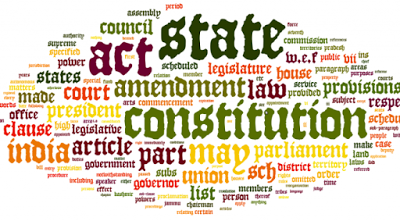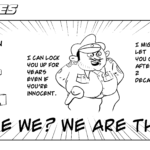The Crown’s Fancy: A Look into the Doctrine of Pleasure (Part- I)
Introduction
The
‘Doctrine of Pleasure’ is a principle of the common law, the origins of which
may be traced back to the United Kingdom. The Doctrine of Pleasure is a special
prerogative of the British Crown. Similar provisions have been included in
the Constitution of India to protect the interest of civil servants as well as
ensure national security and look after public interest. The Doctrine of
Pleasure says that certain authorities hold office till he or she enjoys
the confidence of the President or the Governor. One exception to this Doctrine
is that it could be excluded by a Statute of the Parliament. The
rule in England was that a civil servant can hold his office during the pleasure
of the crown and the service will be terminated any time the crown wishes. The
same rule is applied in India.
‘Doctrine of Pleasure’ is a principle of the common law, the origins of which
may be traced back to the United Kingdom. The Doctrine of Pleasure is a special
prerogative of the British Crown. Similar provisions have been included in
the Constitution of India to protect the interest of civil servants as well as
ensure national security and look after public interest. The Doctrine of
Pleasure says that certain authorities hold office till he or she enjoys
the confidence of the President or the Governor. One exception to this Doctrine
is that it could be excluded by a Statute of the Parliament. The
rule in England was that a civil servant can hold his office during the pleasure
of the crown and the service will be terminated any time the crown wishes. The
same rule is applied in India.
This
doctrine talks of power to dismiss a Government servant at pleasure and is
subject to only those exceptions which are specified in the Constitution
itself. Civil Servants are considered as the back bone of the
administration. In order to ensure the progress of the country it is essential
to protect civil servants from political and personal influence. So provisions
have been included in the Constitution of India to protect their interest in
order to ensure national security and public interest.
doctrine talks of power to dismiss a Government servant at pleasure and is
subject to only those exceptions which are specified in the Constitution
itself. Civil Servants are considered as the back bone of the
administration. In order to ensure the progress of the country it is essential
to protect civil servants from political and personal influence. So provisions
have been included in the Constitution of India to protect their interest in
order to ensure national security and public interest.
Before
understanding the meaning of ‘Doctrine of Pleasure’ in Indian
Context, let us first understand the genesis of this term.
understanding the meaning of ‘Doctrine of Pleasure’ in Indian
Context, let us first understand the genesis of this term.
Doctrine of Pleasure- Meaning
This
Doctrine has its origin in the Common Law of England. The origin of
the Doctrine of Pleasure can be traced to a Latin Maxim durante
bene placito which means “during good pleasure” or “during the
pleasure of the appointer” as opposed to an office held dum bene se gesserit which means “during
good conduct”, also called quadiu se
bene gesserit (“as long as he shall behave himself well”).[1]
Black’s Dictionary defines ‘Pleasure Appointment’ as the assignment of someone
to employment that can be taken away at any time, with no requirement for
notice or hearing.[2]
Doctrine has its origin in the Common Law of England. The origin of
the Doctrine of Pleasure can be traced to a Latin Maxim durante
bene placito which means “during good pleasure” or “during the
pleasure of the appointer” as opposed to an office held dum bene se gesserit which means “during
good conduct”, also called quadiu se
bene gesserit (“as long as he shall behave himself well”).[1]
Black’s Dictionary defines ‘Pleasure Appointment’ as the assignment of someone
to employment that can be taken away at any time, with no requirement for
notice or hearing.[2]
It
was thus affirmed by the Court of Appeal in Dunn v. R[3]
that such rule had its origin in the Latin phrase “durante bene placito”
(“during good pleasure”), or “durante bene placito regis” (“during
good pleasure of the King”). It was held:
was thus affirmed by the Court of Appeal in Dunn v. R[3]
that such rule had its origin in the Latin phrase “durante bene placito”
(“during good pleasure”), or “durante bene placito regis” (“during
good pleasure of the King”). It was held:
“… I take it that
persons employed as the petitioner was in the service of the Crown except in
cases where there is some statutory provision for a higher tenure of office,
are ordinarily engaged in the understanding that they hold their employment at
the pleasure of the Crown. So I think that there must be imported into the
contract for the employment of the petitioner, the term which is applicable to
civil servants in general, namely that the Crown may put an end to the
employment at its pleasure.
persons employed as the petitioner was in the service of the Crown except in
cases where there is some statutory provision for a higher tenure of office,
are ordinarily engaged in the understanding that they hold their employment at
the pleasure of the Crown. So I think that there must be imported into the
contract for the employment of the petitioner, the term which is applicable to
civil servants in general, namely that the Crown may put an end to the
employment at its pleasure.
The
scope of the doctrine was further expanded upon in Shenton v. Smith[4],
where the Privy Council went as far as observing that the pleasure doctrine was
a ‘necessity’ because:
scope of the doctrine was further expanded upon in Shenton v. Smith[4],
where the Privy Council went as far as observing that the pleasure doctrine was
a ‘necessity’ because:
“The difficulty of
dismissing servants whose continuance in office is detrimental to the State
would, if it were necessary to prove some offence to the satisfaction of a
jury, be such as to seriously impede the working of the public service.”
dismissing servants whose continuance in office is detrimental to the State
would, if it were necessary to prove some offence to the satisfaction of a
jury, be such as to seriously impede the working of the public service.”
Doctrine of Pleasure in
India
India
In India, Part XIV of the
Constitution of India deals with services under The Union and The State.
Article 310 of the Indian Constitution incorporates the Common law doctrine of
pleasure and expressly provides that all persons who are members of the Defence
Services or the Civil Services of the Union or of All-India Services
hold office during the ‘pleasure of the President’. Similarly, members of the
State Services hold office during the ‘pleasure of the Governor’. The rule is
qualified by the words “except” or “expressly provided by the Constitution.”[5] Thus Article 310 itself places
restrictions and limitations on the exercise of the pleasure under Article 310
are limited by Article 311(2). The services of permanent Government servant
cannot be terminated except in accordance with rules made under Article 309,
subject to the procedure in Article 311(2) of the Constitution and the
fundamental rights. Thus Article 311 becomes a proviso to Article 310 and
services of any civil servants cannot be terminated at pleasure unless the
mandatory provisions of Article 311 have been observed.[6]
Doctrine of pleasure is further restricted by the general law of the land which
empowers any civil servant to file suit in a court of law for enforcing any
condition of his service and for claiming arrears of pay. Power to dismiss at
pleasure any civil servant is not a personal right of the President or the
Governor as the case may be. It is an executive power which is to be exercised
at the advice of council of ministers. The Doctrine of pleasure as contained in
Article 310, being a constitutional provision, cannot be abrogated by any
legislative or executive law; therefore Article 309 is to be read subject to
Article 310.
Doctrine of Pleasure under the Indian Constitution is also based on the
same policy considerations as it existed under the common law in England.
Though doctrine of pleasure is accepted in India as it has developed in
England, it has not been completely accepted in India.
Constitution of India deals with services under The Union and The State.
Article 310 of the Indian Constitution incorporates the Common law doctrine of
pleasure and expressly provides that all persons who are members of the Defence
Services or the Civil Services of the Union or of All-India Services
hold office during the ‘pleasure of the President’. Similarly, members of the
State Services hold office during the ‘pleasure of the Governor’. The rule is
qualified by the words “except” or “expressly provided by the Constitution.”[5] Thus Article 310 itself places
restrictions and limitations on the exercise of the pleasure under Article 310
are limited by Article 311(2). The services of permanent Government servant
cannot be terminated except in accordance with rules made under Article 309,
subject to the procedure in Article 311(2) of the Constitution and the
fundamental rights. Thus Article 311 becomes a proviso to Article 310 and
services of any civil servants cannot be terminated at pleasure unless the
mandatory provisions of Article 311 have been observed.[6]
Doctrine of pleasure is further restricted by the general law of the land which
empowers any civil servant to file suit in a court of law for enforcing any
condition of his service and for claiming arrears of pay. Power to dismiss at
pleasure any civil servant is not a personal right of the President or the
Governor as the case may be. It is an executive power which is to be exercised
at the advice of council of ministers. The Doctrine of pleasure as contained in
Article 310, being a constitutional provision, cannot be abrogated by any
legislative or executive law; therefore Article 309 is to be read subject to
Article 310.
Doctrine of Pleasure under the Indian Constitution is also based on the
same policy considerations as it existed under the common law in England.
Though doctrine of pleasure is accepted in India as it has developed in
England, it has not been completely accepted in India.
Article
309
309
Article 309 of the Constitution
reads as follows: –
reads as follows: –
“Recruitment and conditions of
service of persons serving the Union or a State Subject to the provisions of
this Constitution, Acts of the appropriate Legislature may regulate the
recruitment, and conditions of service of persons appointed, to public services
and posts in connection with the affairs of the Union or of any State;”[7]
service of persons serving the Union or a State Subject to the provisions of
this Constitution, Acts of the appropriate Legislature may regulate the
recruitment, and conditions of service of persons appointed, to public services
and posts in connection with the affairs of the Union or of any State;”[7]
The above Article empowers the
Parliament to make laws to regulate the recruitment and conditions of service
of persons appointed to public services and posts in connection with the
affairs of the Union[8]. It also provides an authority to the
President to make rules for the above purposes until provision in that behalf
is made by or under an Act of Parliament.
Parliament to make laws to regulate the recruitment and conditions of service
of persons appointed to public services and posts in connection with the
affairs of the Union[8]. It also provides an authority to the
President to make rules for the above purposes until provision in that behalf
is made by or under an Act of Parliament.
Article
310
310
This Doctrine of
Pleasure is embodied in India in Article 310(1).
Pleasure is embodied in India in Article 310(1).
This
is the general rule which operates “except as expressly provided by
the Constitution.” This means that the Doctrine is subject to
constitutional limitations. Therefore, when there is a specific provision in
the Constitution giving to servant tenure different from that provided
in Article 310, then that servant would be excluded from the
operation of the pleasure doctrine.
It reads as follows:
is the general rule which operates “except as expressly provided by
the Constitution.” This means that the Doctrine is subject to
constitutional limitations. Therefore, when there is a specific provision in
the Constitution giving to servant tenure different from that provided
in Article 310, then that servant would be excluded from the
operation of the pleasure doctrine.
It reads as follows:
“Tenure of office of
persons serving the Union or a State:
persons serving the Union or a State:
(1)
Except
as expressly provided by this Constitution, every person who is a member
of a defence service or of a civil service of the Union or of an all India
service or holds any post connected with defence or any civil post under the
Union, holds office during the pleasure of the President, and every person who
is a member of a civil service of a State or holds any civil post under a State
holds office during the pleasure of the Governor of the State.
Except
as expressly provided by this Constitution, every person who is a member
of a defence service or of a civil service of the Union or of an all India
service or holds any post connected with defence or any civil post under the
Union, holds office during the pleasure of the President, and every person who
is a member of a civil service of a State or holds any civil post under a State
holds office during the pleasure of the Governor of the State.
(2) Notwithstanding that a person holding a civil post under the Union
or a State holds office during the pleasure of the President or, as the case
may be, of the Governor of the State, any contract under which a person, not
being a member of a defence service or of an all India service or of a civil
service of the Union or a State, is appointed under this Constitution to hold
such a post may, if the President or the Governor as the case may be, deems it
necessary in order to secure the services of a person having special
qualifications, provide for the payment to him of compensation, if before the
expiration of an agreed period, that post is abolished or he is, for reasons
not connected with any misconduct on his part, required to vacate that post”[9]
or a State holds office during the pleasure of the President or, as the case
may be, of the Governor of the State, any contract under which a person, not
being a member of a defence service or of an all India service or of a civil
service of the Union or a State, is appointed under this Constitution to hold
such a post may, if the President or the Governor as the case may be, deems it
necessary in order to secure the services of a person having special
qualifications, provide for the payment to him of compensation, if before the
expiration of an agreed period, that post is abolished or he is, for reasons
not connected with any misconduct on his part, required to vacate that post”[9]
Now if
such powers are given to president of India and the governor of states then it
would be really difficult to exercise power on them so there are certain
offices which are outside the purview of Article 310 and Article 311 was put as
a restriction to doctrine of pleasure. The
following are expressly excluded by the Constitution from the rule of
Pleasure. They are[10]:
1. Supreme Court
Judges (Article 124)
such powers are given to president of India and the governor of states then it
would be really difficult to exercise power on them so there are certain
offices which are outside the purview of Article 310 and Article 311 was put as
a restriction to doctrine of pleasure. The
following are expressly excluded by the Constitution from the rule of
Pleasure. They are[10]:
1. Supreme Court
Judges (Article 124)
2. Auditor
General (Article 148)
General (Article 148)
3. High
Court Judges (Article 217, 218)
Court Judges (Article 217, 218)
4. A
member of Public Service Commission (Article 317)
member of Public Service Commission (Article 317)
5. The
Chief Election Commissioner.
Chief Election Commissioner.
(TO BE CONTINUED IN PART II HERE)
References:
[1] Union of India v Tulsiram Patel,(1985) 3 SCC 398
[2]
Suyash Verma, Origin and Scope of
Doctrine of Pleasure in India, available at http://www.desikanoon.co.in/2014/06/origin-and-scope-of-doctrine-of.html, (last
visited on 23/03/2016)
Suyash Verma, Origin and Scope of
Doctrine of Pleasure in India, available at http://www.desikanoon.co.in/2014/06/origin-and-scope-of-doctrine-of.html, (last
visited on 23/03/2016)
[3] (1896) 1 QB 116
[4] 1895 AC 229 (PC)
[5] Ibid
7
7
[6] Abhinav Garg,Yamini
Rajora, Doctrine of Pleasure-An
Analytical Study, available at http://www.lawctopus.com/academike/doctrine-of-pleasure/,
(last visited on 23/03/2016)
Rajora, Doctrine of Pleasure-An
Analytical Study, available at http://www.lawctopus.com/academike/doctrine-of-pleasure/,
(last visited on 23/03/2016)
[7] Article
309of the Constitution of India
309of the Constitution of India
[8] State of
Karnataka & Ors. v. Ameerbi & Ors., 2006 (13) SCALE 319
Karnataka & Ors. v. Ameerbi & Ors., 2006 (13) SCALE 319
[9] Article
310of the Constitution of India
310of the Constitution of India
[10]Srividya
Sastry, Doctrine of Pleasure as under the
Indian Constitution, available at http://www.legalservicesindia.com/article/article/doctrine-of-pleasure-as-under-the-indian-constitution-1643-1.html,(last visited
on 23/03/2016)
Sastry, Doctrine of Pleasure as under the
Indian Constitution, available at http://www.legalservicesindia.com/article/article/doctrine-of-pleasure-as-under-the-indian-constitution-1643-1.html,(last visited
on 23/03/2016)





Leave a Reply